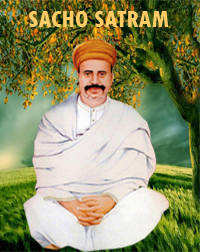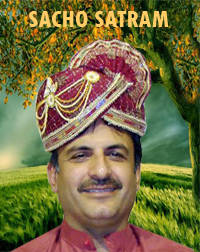During a spiritually uplifting Satsang, Hazir Swaroop Sai Sadhram Saheb shared profound insights on the consequences of our karmas. Saijan narrated a story that served as a powerful illustration of how our actions ultimately come back to us.
However, greed took over their hearts. When the younger brother fell ill, the elder brother and his wife devised a devious plan. They conspired with the doctor, convincing him to mix poison with the younger brother’s medicine. Their intention was to eliminate the younger brother so they could claim the entire inheritance without sharing it.
Tragically, the younger brother succumbed to the poisoned medicine and passed away. Time moved on, and the elder brother and his wife were later blessed with a son. Their joy, however, soon turned to sorrow, as the boy frequently fell ill. Despite consulting the best doctors and spending heavily on treatments, their son’s health did not improve. The couple faced severe financial difficulties and were reduced to poverty, yet their son’s condition remained unchanged.
One day, when the boy was gravely ill, he revealed a shocking truth to his parents. He disclosed that he was the reincarnation of the younger brother they had wronged and had returned as their son to teach them a life-altering lesson about karma. This revelation left the couple devastated and remorseful, as they finally understood the gravity of their past actions.
Saijan used this story to emphasize that we must never harm others and always strive to lead a virtuous life. He advised that immersing ourselves in Naam, Dhyan, and Simran, and seeking the company of saints and spiritually enlightened individuals, helps us avoid negative deeds. The practice of Naam, Dhyan, and Simran not only purifies our minds but also anchors them, preventing them from wandering into destructive thoughts.
Saijan concluded by encouraging everyone to remain in the company of virtuous people and engage in spiritual practices to nurture positivity and righteousness in life.
Sacho Satram



